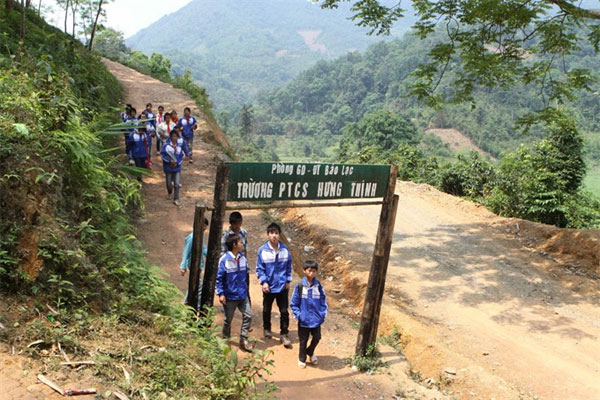VietNamNet Bridge – Take more than a year if needed, but get good advice and avoid previous education reform mistakes, NA deputies told the Government on Thursday.

Students from the Hung Thinh secondary school in Bao Lac District of the northern province of Cao Bang on their way to school. — VNA/VNS Photo Minh Quyet
Responding to a proposal by the Ministry of Education and Training (MoET) to delay planned educational reforms by a year, a majority of the 14th National Assembly deputies advised caution.
They said education was a top national priority and the reforms must be carefully designed and executed even if it takes longer than a year.
The deputies also urged the ministry to consult with education experts, both national and international, to avoid making the same mistakes as in previous reforms.
The ministry had proposed the reform of the system, including textbook content, be pushed back from the 2018-19 academic year dictated in the 13th NA’s Decision No 88 issued in 2014.
Deputies asked the ministry to present a more detailed implementation process with solutions to ongoing issues and contingency plans.
They suggested that the ministry provides local authorities with guidelines and information to prepare for the reform. The public should also be given more information about the planned reforms, they said.
Deputy Duong Minh Tuan from the southern province of Ba Ria–Vung Tau said a major concern among voters in his locality was the equipping of children with life skills to protect themselves from sex predators and other dangers like drowning. They were also anxious about the affordability of new textbooks, he said.
Nguyen Thi Kim Tien, a deputy from the central city of Da Nang, said that while important, textbooks were just one of many factors in the country’s education reform effort. Another equally important factor, if not more so, was the capability of teachers to work with the new textbook content and students every day.
Tien said the teachers should be able to obtain necessary training to prepare for the reform. She also urged the ministry to address the shortage of teachers in mountainous and remote areas as well as the upgrading of facilities there. It has been reported often that the facilities in such areas are very poor compared to the rest of the country.
Also stressing the importance of education quality in mountainous and remote regions, deputy Trieu The Hung from the Central Highlands province of Lam Dong called for more Government support to ethnic minority groups for preserving their cultural heritages and for young students to catch up with their peers in other parts of the country. The province is home to numerous Vietnamese ethnic groups.
Hung said that in order to protect the groups’ languages, which are crucial for preserving their cultural heritage and identities, classes in their own languages must be available from early grades onwards.
He also said that the current policy to award students from mountainous and remote regions with extra marks in the university entrance exams would not help them catch up, and it was also unfair to others.
The only way to address this issue to invest more in education, to improve teachers’ living standards and teaching facilities, Hung said.
Budgetary concerns
Minister of Education and Training Phung Xuan Nha said that the ministry will make all financial details about the reform widely available in light of rumours in recent years that it would cost the public a massive amount.
So far, the expense is estimated at just under US$2 million, Nha said.
Nha was responding to a demand made by deputy Nguyen Huu Cau that the ministry publicises the reform’s financial reports, detailing expenses, including expenditures incurred thus far.
The minister said that there were many challenges in transforming the country’s education system, which has heavily and rigidly been in favour of the amount of knowledge it imparts rather than develop students’ skills and independent thinking.
Nha said that the ministry did not see education reform as a total replacement of old material. It should develop the existing value of the old material with new and improved methods, he added.
“The ministry views reform as a process which does not have a deadline… we will continue to address issues and constantly adapt our approach,” Nha said.
The minister said the delay in implementing reforms had been proposed because the ministry needs to more time to consult with education experts and teachers, review their feedback and make necessary changes.
On the redesigning of school textbooks, Nha said the ministry encourages qualified and capable stakeholders to get involved in the process.
He said: “My observation is that most teachers are more than happy to welcome changes to our education system and the ministry will provide them with training and guidelines so they can best prepare for the reform.”
Source: VNS